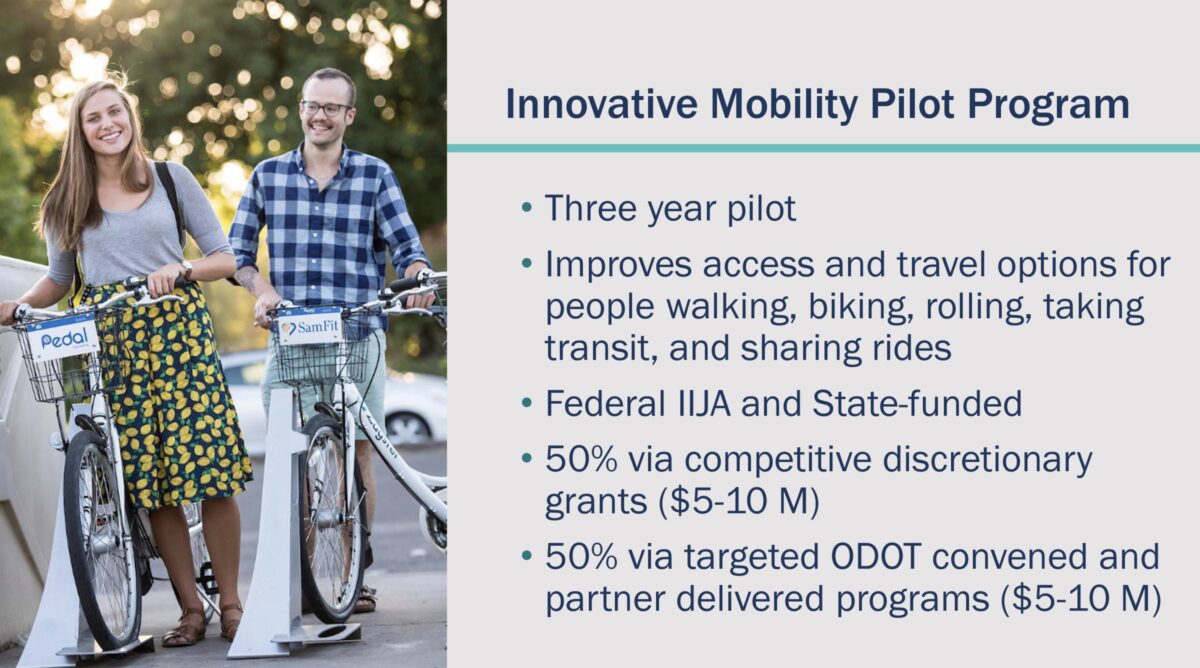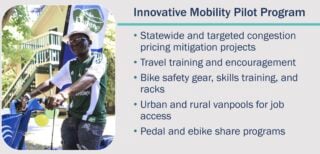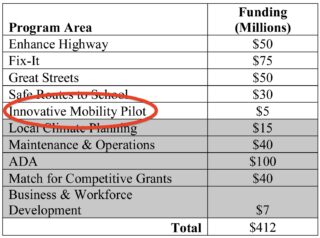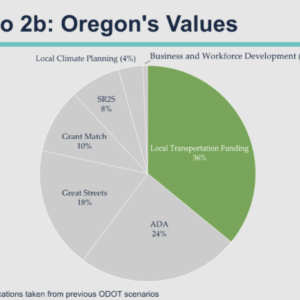
“I’m not referring to highways. I’m referring to more on-the-ground, regular hands-on projects.”— Alando Simpson, OTC Commissioner
It’s not everyday we get to report about a new grant program from the State of Oregon that would pump millions into active transportation projects and programs; but that’s exactly what the new Innovative Mobility Pilot Program aims to do.
And what’s even more amazing is that it didn’t years of activism to make it happen.
The concept for the new program was first proposed by Oregon Transportation Commission member (and Portland resident) Alando Simpson. Simpson, who is also a strong supporter of freeway expansion projects, introduced his idea at the March 10th OTC meeting during a discussion about how best to allocate $412 million in funding coming to Oregon via the federal Infrastructure Investment and Jobs Act (IIJA).

“I’d like to look at something a little outside-the-box that’s going to allow the Commission to have more autonomy around spending dollars innovatively. And I’m not referring to highways. I’m referring to more on-the-ground, regular hands-on projects,” Simpson explained. He went on to express that most of the existing funding avenues are too wound up in red tape for ODOT to directly oversee and how confusing most grant programs can be for smaller, grassroots organizations to access.
During his remarks, Commissioner Simpson made it clear he felt ODOT needs to do more to address what he constantly hears from the public. “I believe [a program like this] can leverage a lot of other investments that will address the concern that the community is raising, which is heavily predicated around social and environmental injustice as it pertains to the transportation system.”
Following the March 10th meeting, ODOT staff hashed out Simpson’s idea and plan to pitch the more fleshed out version of it back to the full OTC at their meeting today (3/30).
According to materials posted to the OTC website, the Innovative Mobility Pilot Program (IMPP) would be a three-year pilot and would take $5 million a year from IIJA discretionary funding and $5 million from existing ODOT funding for a total of $10 million.
Here’s more from the proposal:
Advertisement
“The IMPP will provide grants to community-based organizations and government agencies for innovative public and active transportation programs and projects that enhance sustainable and equitable mobility. Dedicating both federal funds and state funds will allow ODOT to assign the appropriate fund types to recipients. For example, many governmental entities are familiar with the strings that come with federal funds, while community-based organizations might struggle to meet all federal requirements but could more effectively use state dollars.”
The program would be open to nonprofits, local agencies, transit agencies, metropolitan planning agencies (like Metro), and tribes. Simpson hinted it might be run out of ODOT’s Urban Mobility Office, which up until now has been exclusively focused on freeway expansion projects.
What’s particularly promising to us is that the grants will be given out to, “community needs that make it easier for people to walk, roll, bike, share rides, vanpool, and take public transportation to meet daily travel needs.” And unlike many other state and federal grant programs that require years of effort to apply, the IIMP would have at least $3 million in an “immediate opportunities” fund that would allow applications to be funded continually as they come in.

It’s also interesting to note that, based on Commissioner Simpson’s remarks and the outline provided by ODOT, this program seems to be a direct response to extensive criticism ODOT receives from many Oregonians for being out-of-touch with the community. One bulleted list that describes the program states that its intent is to, “Build community trust with ODOT, establish, and maintain personal relationships and networks, especially in communities where historically ODOT has struggled to engage.”
The type of projects the new program seeks to fund are also intriguing and illustrate that ODOT and OTC members have heard public criticisms that they are too focused on cars, driving and freeway expansions. Check out some of the projects types ODOT says the program could fund:
- Increase mode share for non-single occupancy vehicle transportation options and reduce Vehicle Miles Traveled (VMT), and related Greenhouse Gas (GHG) Emissions.
- Electric bike lending library for low income communities
- Multimodal transportation wallet for low income (eg., bus pass, bike share membership, and car sharing membership)
- Bicycle safety gear, skills and safety training, and bike racks
- Houseless persons pedestrian and bicycle safety and security outreach
- Incubate and launch pedal and electric bikeshare systems.
- Incubate and launch Transportation Management Associations, focusing first on the Portland Metro/Clackamas County Area
- Create a bikeshare system that serves urban areas such as Eugene/Springfield, Corvallis, Salem/Keizer, and other interested communities. Under this scenario, ODOT would purchase electric bikes and hire a non-profit to manage a multi-city bikeshare system.

Also of note is that some of the grants would be targeted toward projects — such as vanpools, reduced bus fare and bike share programs — that would help Oregonians “mitigate impacts of congestion pricing,” a nod to forthcoming tolls on Portland metro area freeways.
This new, non-car-centric, non-highway-focused proposal comes on the heels of deepening skepticism from OTC members about how much the state spends on freeway expansions.
Of course since the new program would be part of the IIJA allocation, it means other categories of funding would need to be decreased to create it. The OTC will discuss this at their meeting today when they see, for the first time, ODOT’s proposal based on Commissioner Simpson’s idea. The plan is to discuss it today and then return to the OTC in May with a final proposal and potential adoption of the new program.
For Simpson, this is an opportunity to change the reputation of the OTC and ODOT and provide “seed money” for more innovative projects. “I just need to come up with something more creative and trigger a new market opportunity for us to get into cleaner forms of transportation,” he said at the March 10th meeting. “Like alternative forms of transportation that can address our climate and social challenges.”






Thanks for reading.
BikePortland has served this community with independent community journalism since 2005. We rely on subscriptions from readers like you to survive. Your financial support is vital in keeping this valuable resource alive and well.
Please subscribe today to strengthen and expand our work.
OTC commissioners are not appointed to represent a selected part of the state (i.e. the area of Oregon they happen to live in). This isn’t a mini-legislature. Ideally they should be receptive to viewpoints from all parts of the state, and I think they do a good job of that. So let’s back away from concepts that Commissioner X is suppose to represent the Portland metro area, Commission Y the interests of east Oregon, etc.
Yes! That is true. My mistake. I’ve edited the story to say he lives in Portland. FWIW he mentioned Portland specifically when pitching the idea.
Interesting, ODoT taking the lead! (Too bad the bike side of Zagster is dead…this ‘bike library’ program would have been their bread and butter …but perhaps Cascadia Mobility will step in?)
Bike Libraries are a great idea. There is a group in New York doing this using old uber bikes. Bring them in!